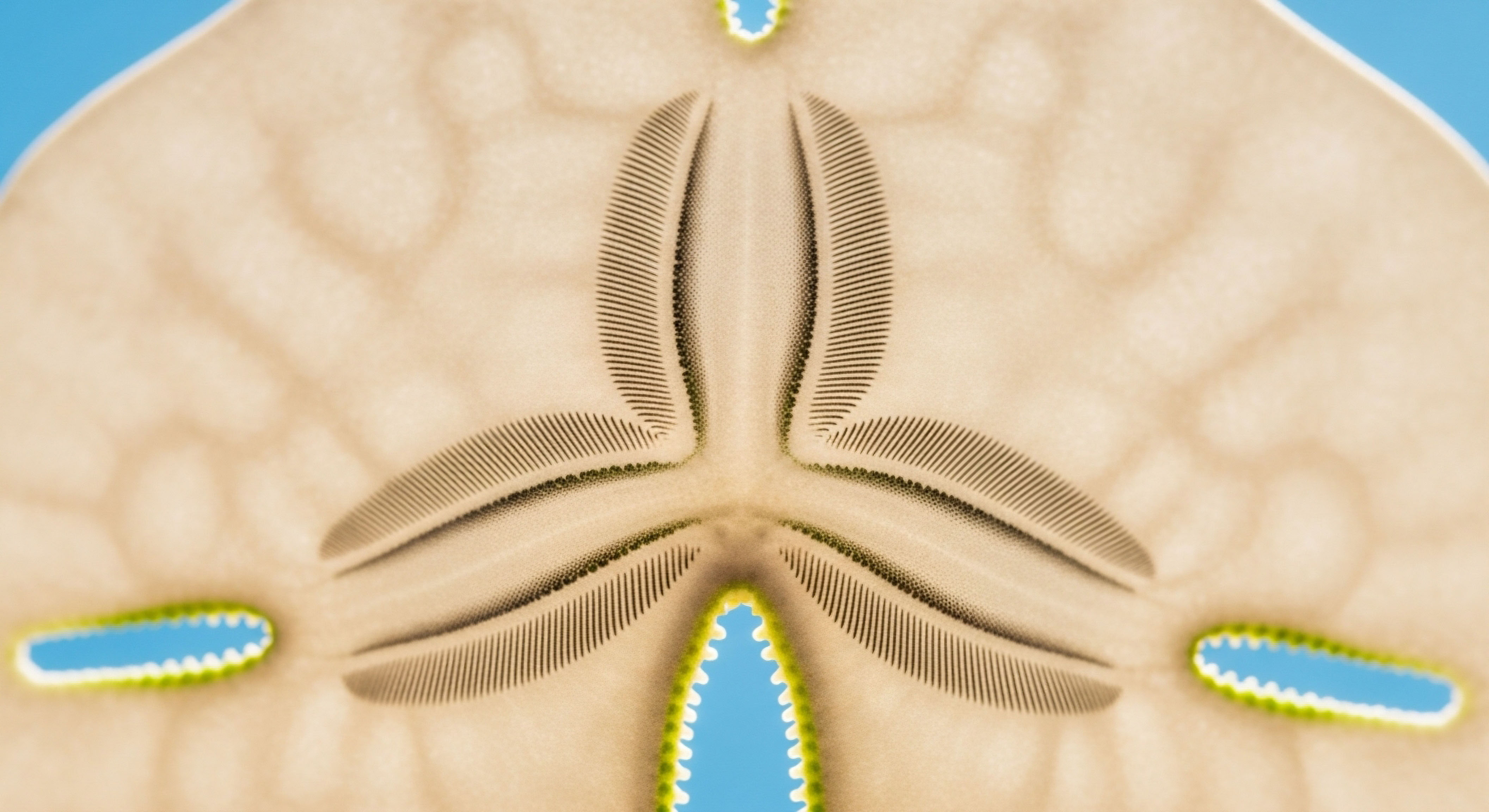

The Biological Cascade of Diminished Vitality
The perception of aging as an inevitable decline is a fundamental misconception. Biological aging is not a passive surrender to time but a dynamic process characterized by the systemic erosion of optimal physiological function. This erosion directly impacts performance, cognitive acuity, and overall vitality, creating a deficit that many accept as immutable. Understanding this cascade is the first step in reclaiming your biological sovereignty.

The Hormonal Underpinnings of Prime Performance
At the core of youthful vigor and peak performance lies a finely tuned endocrine system. Hormones act as master regulators, orchestrating everything from metabolic rate and muscle synthesis to cognitive function and mood. As individuals progress through life, a natural decline in key anabolic hormones ∞ such as testosterone, dehydroepiandrosterone (DHEA), and growth hormone (GH) ∞ commences. This decline is not merely a statistical anomaly; it is a direct driver of age-related physiological changes.

Testosterone’s Role in Anabolic Drive and Cognitive Edge
Testosterone, often mistakenly relegated to male reproductive health, is a critical anabolic hormone for both sexes, profoundly influencing muscle mass, bone density, energy levels, and cognitive processing. Studies consistently link lower testosterone levels with increased body fat, decreased muscle strength, reduced libido, and impaired cognitive functions like memory and executive processing.
The steady reduction of testosterone from its peak in the late 20s and early 30s creates a metabolic and functional disadvantage, directly contributing to a perceived loss of “youthful” capabilities.

Growth Hormone and IGF-1 ∞ The Pillars of Cellular Regeneration
The pulsatile release of Growth Hormone (GH) from the pituitary gland, which stimulates the liver to produce Insulin-like Growth Factor 1 (IGF-1), is paramount for cellular repair, tissue regeneration, and metabolic regulation. Diminished GH/IGF-1 signaling, a hallmark of aging, impairs the body’s ability to recover from stress, build and maintain lean tissue, and efficiently metabolize energy substrates. This deficit contributes to sarcopenia (muscle loss), reduced skin elasticity, and a slower metabolic rate, accelerating the physical manifestations of aging.

Thyroid Function and Metabolic Velocity
Thyroid hormones are the primary regulators of the body’s metabolic rate, dictating the speed at which cells convert fuel into energy. Suboptimal thyroid function, which can become more prevalent with age due to various factors including autoimmune conditions and nutrient deficiencies, leads to a sluggish metabolism. This translates to decreased energy, weight gain, impaired cognitive function, and a general feeling of lethargy ∞ all symptoms often misattributed solely to “getting older.”

Metabolic Dysregulation as an Accelerant
Beyond hormonal shifts, the aging process is often accompanied by a progressive dysregulation of metabolic pathways. Insulin resistance, mitochondrial dysfunction, and altered lipid profiles become more common, creating an internal environment that favors catabolism over anabolism and inflammation over repair. This metabolic drift is not an independent event but is intricately linked to hormonal status and lifestyle factors.

Insulin Resistance and the Glycemic Burden
The body’s sensitivity to insulin, the hormone responsible for glucose uptake by cells, often diminishes with age and poor metabolic health. Chronically elevated blood glucose levels and persistent insulin resistance create a pro-inflammatory state, damage blood vessels, and promote fat storage, particularly visceral fat. This metabolic inflexibility reduces the body’s capacity to utilize fat for energy, leading to fatigue and hindering optimal physical performance.

Mitochondrial Decline ∞ The Engine’s Slowdown
Mitochondria, the powerhouses of our cells, become less efficient and more prone to generating reactive oxygen species (ROS) with age. This decline in mitochondrial function directly impacts cellular energy production, contributing to fatigue, reduced exercise capacity, and accelerated cellular senescence. Restoring mitochondrial health is a critical component of combating biological aging.

The Neurobiological Landscape of Cognitive Decline
The impact of aging extends deeply into the central nervous system. Neurotransmitter imbalances, reduced neurogenesis, and increased oxidative stress can lead to cognitive deficits, mood disturbances, and diminished drive. Hormonal deficiencies and metabolic dysregulation discussed previously play a significant role in these neurobiological changes, underscoring the interconnectedness of the body’s systems.

Neurotransmitter Balance and Mood Regulation
Hormones like testosterone, estrogen, and DHEA directly influence neurotransmitters such as dopamine, serotonin, and norepinephrine, which are critical for mood, motivation, and cognitive function. Declines in these foundational hormones can lead to increased susceptibility to depression, anxiety, and a general lack of motivation, further compounding the perceived limitations of aging.
The decline in testosterone levels from peak in the late 20s and early 30s directly correlates with increased body fat, decreased muscle strength, reduced libido, and impaired cognitive functions.


Engineering Your Biological Operating System
Reclaiming peak performance and vitality is an act of strategic biological engineering. It requires a systematic approach to recalibrate hormonal balance, optimize metabolic function, and enhance cellular resilience. This is not about superficial fixes; it is about understanding and intervening in the fundamental mechanisms that govern biological aging and performance.

Hormonal Recalibration Protocols
The endocrine system, when properly understood and managed, offers the most potent leverage for reversing age-related functional decline. Interventions focus on restoring hormone levels to their optimal physiological ranges, thereby reactivating anabolic processes and enhancing systemic function.

Testosterone Replacement Therapy (TRT)
For individuals diagnosed with hypogonadism or experiencing symptoms linked to suboptimal testosterone levels, TRT represents a foundational intervention. Administered via injections, gels, or patches, TRT restores testosterone to a functional, youthful range. This intervention supports muscle protein synthesis, bone mineral density, improved mood, enhanced libido, and sharper cognitive function. It is critical to approach TRT with rigorous medical supervision, including regular monitoring of hormone levels, hematocrit, and prostate health markers to ensure safety and efficacy.

Growth Hormone Secretagogues and Peptide Therapies
Peptides offer a sophisticated avenue for stimulating the body’s natural production of key anabolic compounds. Growth Hormone Secretagogues (GHSs), such as Ipamorelin and CJC-1295, work by stimulating the pituitary gland to release GH. This approach aims to elevate GH and IGF-1 levels, supporting tissue repair, fat metabolism, and immune function. Other peptides, like BPC-157, demonstrate remarkable capabilities in accelerating tissue healing and reducing inflammation, offering a powerful tool for recovery and resilience.

Thyroid Hormone Optimization
Ensuring optimal thyroid hormone levels is crucial for metabolic velocity and energy production. This may involve prescription thyroid medications, such as levothyroxine or liothyronine, or combinations thereof, tailored to individual needs based on comprehensive thyroid panel testing. The goal is to achieve euthyroid status, maximizing metabolic efficiency and alleviating symptoms of fatigue and cognitive fog.

Metabolic Conditioning and Nutritional Precision
Optimizing metabolic health is a parallel strategy that amplifies the benefits of hormonal interventions and enhances overall cellular function. This involves a precise approach to nutrition, exercise, and stress management.

Nutrient-Dense Fueling Strategies
A diet focused on whole, unprocessed foods is paramount. Emphasis is placed on adequate protein intake to support muscle synthesis, healthy fats for hormone production and cellular membrane integrity, and complex carbohydrates for sustained energy. Specific micronutrient deficiencies, such as Vitamin D, Magnesium, and Omega-3 fatty acids, can impair hormonal function and metabolic processes, necessitating targeted supplementation based on biomarker analysis.

Strategic Exercise for Anabolic Signaling
Resistance training is indispensable for stimulating muscle protein synthesis and maintaining lean body mass, directly counteracting sarcopenia. High-intensity interval training (HIIT) and consistent aerobic conditioning improve cardiovascular health, enhance insulin sensitivity, and boost mitochondrial biogenesis. The synergy between hormonal optimization and a targeted exercise regimen creates a powerful anabolic environment.

Mitochondrial Support and Bioenergetic Enhancement
Strategies to bolster mitochondrial health include targeted supplementation with compounds like CoQ10, PQQ, and L-Carnitine, which support electron transport chain function and reduce oxidative stress. Periodic fasting or time-restricted eating can also promote cellular autophagy and improve mitochondrial efficiency. Understanding and enhancing cellular energy production is a cornerstone of long-term vitality.

Neurobiological Optimization and Stress Resilience
The brain is the command center, and its optimal function is inextricably linked to hormonal and metabolic health. Interventions aimed at neuroprotection, neurotransmitter balance, and stress resilience are vital for comprehensive performance enhancement.

Cognitive Enhancement and Neurotransmitter Support
Optimizing sleep architecture is non-negotiable, as it is during sleep that crucial restorative processes, memory consolidation, and hormonal regulation occur. Techniques such as targeted supplementation (e.g. Magnesium L-Threonate, L-Theanine), light management, and consistent sleep schedules can dramatically improve sleep quality. Furthermore, interventions that support neurotransmitter synthesis and balance, such as Alpha-GPC for choline availability or specific amino acids, can sharpen focus and improve mood.

Stress Management and Cortisol Regulation
Chronic stress elevates cortisol, a catabolic hormone that can disrupt hormonal balance, impair immune function, and drive abdominal fat accumulation. Implementing stress-reduction techniques, such as mindfulness meditation, deep breathing exercises, and adequate recovery periods, is essential. For individuals with significantly dysregulated cortisol rhythms, targeted interventions may be considered under expert guidance.
The strategic use of peptide therapies, such as GH secretagogues, can stimulate the body’s natural production of key anabolic compounds, supporting tissue repair, fat metabolism, and immune function.


Timing the Recalibration of Your Prime
The decision to engage in biological optimization is not a universal prescription but a personalized strategy dictated by individual biomarkers, performance goals, and life stage. Understanding the optimal timing and sequencing of interventions ensures maximum efficacy and safety.

Assessing the Biological Baseline
The journey toward biological recalibration begins with a comprehensive assessment. This involves detailed laboratory testing to establish a precise understanding of your current hormonal status, metabolic health, and physiological markers. Without this baseline, any intervention is speculative.

Comprehensive Biomarker Analysis
A thorough panel should include, but not be limited to ∞ total and free testosterone, estradiol, DHEA-S, SHBG, LH, FSH, GH, IGF-1, fasting insulin, glucose, HbA1c, lipid panel (including particle size), comprehensive thyroid panel (TSH, Free T4, Free T3, Reverse T3, antibodies), and inflammatory markers like hs-CRP. Vitamin D, B12, and ferritin levels are also critical. This data forms the objective foundation for personalized protocol design.

Performance Metrics and Subjective Reporting
Beyond lab values, subjective reporting of energy levels, mood, libido, sleep quality, cognitive function, and physical performance provides crucial context. Tracking these metrics alongside objective data allows for a holistic evaluation of progress and adjustment of interventions.

Phased Implementation for Sustained Results
Biological optimization is a marathon, not a sprint. A phased approach ensures that interventions are integrated logically, allowing the body to adapt and respond effectively.

Phase 1 ∞ Foundational Optimization (months 1-3)
This phase prioritizes establishing fundamental health pillars ∞ optimizing sleep hygiene, implementing a nutrient-dense dietary strategy, and initiating a consistent resistance training program. Micronutrient deficiencies are addressed through targeted supplementation. This phase prepares the body for more direct hormonal or peptide interventions by ensuring basic metabolic and lifestyle functions are optimized.

Phase 2 ∞ Targeted Hormonal and Peptide Intervention (months 3-12)
Once foundational elements are robust, specific hormonal therapies (e.g. TRT, thyroid support) and peptide protocols are introduced. Dosing and administration are carefully managed, with frequent monitoring to assess response and adjust as needed. The goal is to bring key biomarkers into their optimal physiological ranges, not merely within “normal” lab ranges.

Phase 3 ∞ Advanced Optimization and Maintenance (month 12+)
This phase involves fine-tuning protocols, exploring additional peptide therapies for specific goals (e.g. recovery, body composition), and integrating advanced biohacking techniques. Long-term maintenance requires ongoing monitoring, strategic adjustments based on life changes, and a commitment to sustainable lifestyle practices. The focus shifts to sustained peak performance and longevity.

Navigating Individual Variability
The human endocrine and metabolic systems are complex and highly individual. What works optimally for one person may require significant modification for another. Patience, precision, and expert guidance are paramount.

Genetic Predispositions and Epigenetic Influences
Understanding genetic predispositions (e.g. via pharmacogenomic testing) can inform the selection and dosing of interventions. Furthermore, lifestyle choices continuously influence gene expression (epigenetics), highlighting the dynamic interplay between our biology and environment. Interventions should aim to positively influence epigenetic markers toward a more youthful and resilient state.

The Role of a Qualified Medical Professional
Engaging with a physician experienced in hormone optimization, longevity science, and performance medicine is non-negotiable. They provide the clinical expertise, diagnostic tools, and oversight necessary to navigate these powerful interventions safely and effectively. Self-treating with potent biological agents carries significant risks.
The journey toward biological recalibration is phased, beginning with foundational health pillars, followed by targeted hormonal and peptide interventions, and culminating in advanced optimization and long-term maintenance.

The Unyielding Imperative of Biological Mastery
The narrative of inevitable decline is a construct, not a biological decree. Aging is a series of interconnected physiological processes that can be understood, influenced, and, to a significant degree, optimized. By applying principles of endocrinology, metabolic science, and cellular biology, individuals can transcend the perceived limitations of age and unlock unprecedented levels of performance, vitality, and cognitive function.
This is not about chasing youth but about mastering the biological architecture of your life, ensuring that your performance is a deliberate choice, not a consequence of time. The power to sculpt your biological future resides in informed action and a commitment to engineering your own biological superiority.

Glossary

cognitive function

endocrine system

growth hormone

metabolic health

biological engineering

peak performance

their optimal physiological ranges

trt

targeted supplementation

journey toward biological recalibration

biohacking

hormone optimization




